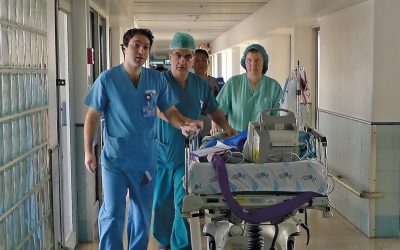Denis Spiller is on a mission. The man charged with guiding Rotary in these isles over the next 12 months is determined to break down a few barriers and reconfigure public perception with the goal of pushing membership through the 50,000 barrier by 2020.
Working in tandem with the next two Presidents, Debbie Hodge (2018-19) and Donna Wallbank (2019-20), Denis is hoping the 3-D 2020 vision will reinvigorate Rotary in Great Britain and Ireland.
A clever tag phrase, maybe, but one month into his new term, Denis knows that failure is not an option. “We are making Rotary relevant to people’s lifestyles and what and how they want to contribute,” he insisted. “Our theme for the next three years has to be growth.”
Denis, a member of the Rotary Club of Strood in Kent, and a former IT training manager with Hewlett Packard for 22 years, is not a man who pulls his punches. His assessment of Rotary is blunt: “we’re too old!”
When asked why this is so, Denis believes that Rotary took its eye off the recruitment ball some 20 years ago. Then, Rotary in Great Britain and Ireland had more than 50,000 members, club sizes were 30 to 35-strong, with an average age of around 60. “That meant we had members in their 40s and 50s who were still working,” explained Denis.
What has changed is people’s lifestyles, how they communicate, how they travel, and when they want to be available.”
At that time, the flow of 40- something Round Table members making the transition to Rotary began to dry up. This, coupled with existing Rotarians retiring and losing work contacts, has led to a lack of new recruits.
It’s been a recipe for decline and if we don’t stem that tide, warned Denis, then the consequences will be uncomfortable.
Dark clouds hovering, but then what is the plan? Denis talked about the need for clubs to get their eyes back on the recruitment ball, grasping the nettle and leaving a legacy in their communities.
Some clubs will merge, some will fold, and new, more dynamic clubs will set up in their place, who are ready to hit the ground running embracing the Rotary ethos of serving their communities.
His focus for the next 12 months is to create new image clubs – something the new president describes as ‘Rotary 2’.
Denis has challenged assistant governors to create a new club in each of their districts which, when achieved, would mean 250 fresh clubs and potentially 2,500 new members.
“Rotary 2 is not a new Rotary,” he explained. “It is a new image of Rotary and these new groups must take full advantage of the new flexibility rules.
“People can meet when they like, do what they like and, importantly, not be tied by tradition. Too many new clubs have become clones of the parent thinking you must have a toast, you have got to say grace, and you have to have a meal, because we gain fellowship though eating together.”
“Well you don’t. And the truth is there is not a single rule in the Rotary rulebook which says you must have a meal.”
“The rule book simply says you have to meet regularly.”
“I know of one club which meets at Costa Coffee on a Saturday morning. My wife’s club, Kings Hill Rotary Club near Maidstone, started five years ago. They said ‘we are not going to be like other clubs’.”
“They don’t have a meal, they meet in a pub room, they have informal meetings and it works.
“One difference is that this club is almost all couples, as opposed to individuals. They have got about 25 members and they are focused on fund-raising more than hands-on. But they do all sorts of things, from beer festivals to farmers’ markets to support the local community.”
It is a formula which may meet with resistance from traditionalists, but Denis is adamant that the previous Rotary model is no longer as relevant as it once was.
It is important to take away some of the formality so new clubs can create their own identity.
Clubs need to be more family-oriented, and be mindful that society has changed, along with the demands on people’s time.
Denis wants to see new Rotary clubs emerge which are project-led.
We live in a society of corporate and social responsibility where volunteering is encouraged as part of career development. So let’s embrace this and not be afraid of using social media, such as Twitter and Facebook to promote and seek new members, he said.
“I don’t personally believe the pressures have changed dramatically from 50 or even 100 years ago,” added Denis.
“Because, even then, people were running businesses. They still had the pressures of sales, and fulfilling orders.”
“However, things happen faster today, without a doubt.”
“Rotary’s founder, Paul Harris had exactly the same challenges, so I don’t accept when people say they have not got the time. It is an easy excuse. If you can get people along and show them true added value, then that will make the difference and they will come again.”
Let them meet as and when they want, and get involved in the things which are important to them and their community.”
“What has changed is people’s lifestyles, how they communicate, how they travel, and when they want to be available.”
“The ‘new image’ club needs to be a product that people aged between 30 and 50 want to be a part of.”
“It could meet in the early evening, or on a Saturday morning, or even online. They won’t want to be tied into a meal every week, or any of the traditions like the loyal toast or the wine draw.”
“Let them create their own traditions, let them meet as and when they want, and get involved in the things which are important to them and their community.”
Above all, said Denis, it is about making Rotary relevant – relevant to today’s generations and their lifestyles.


























































